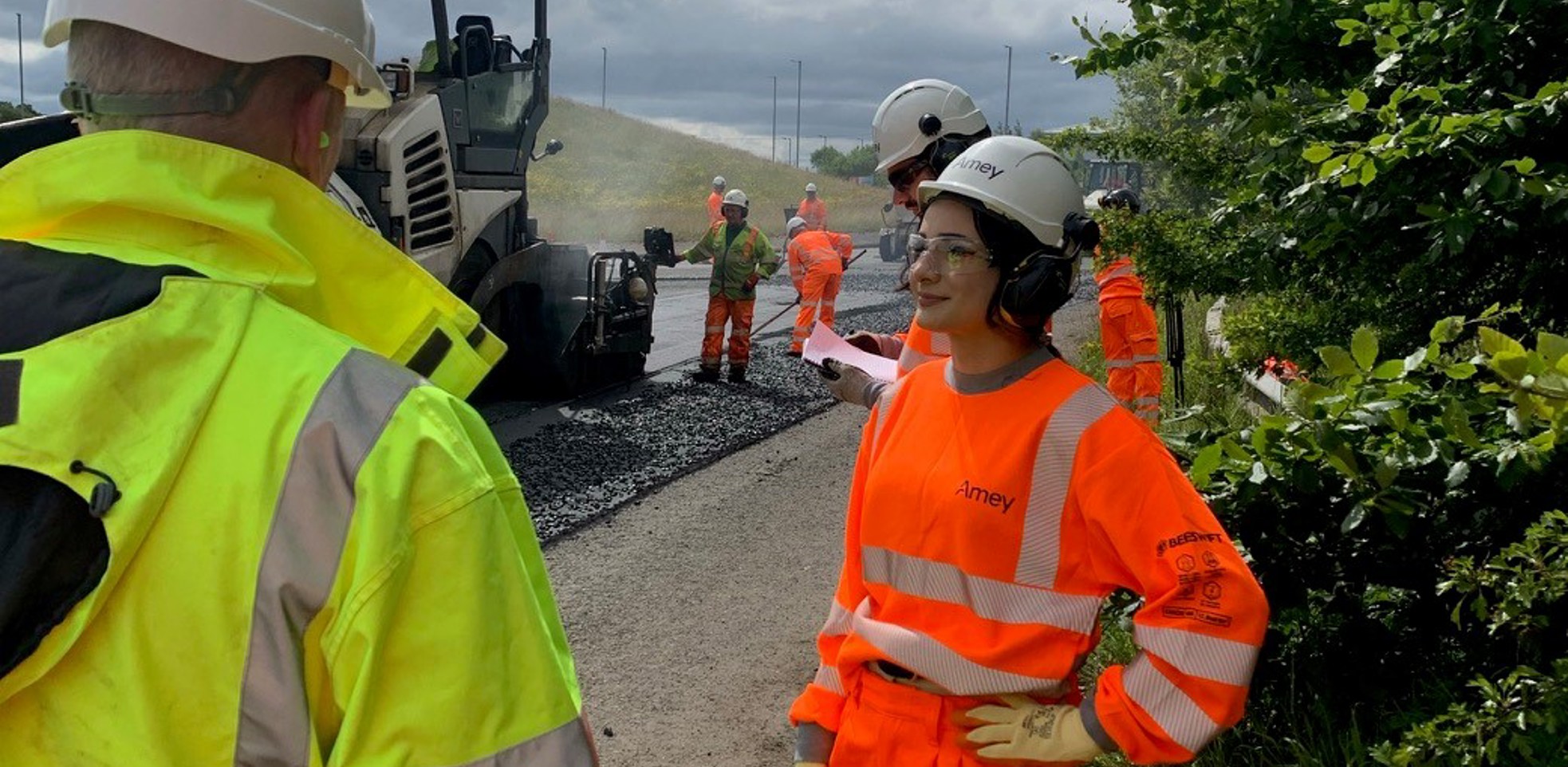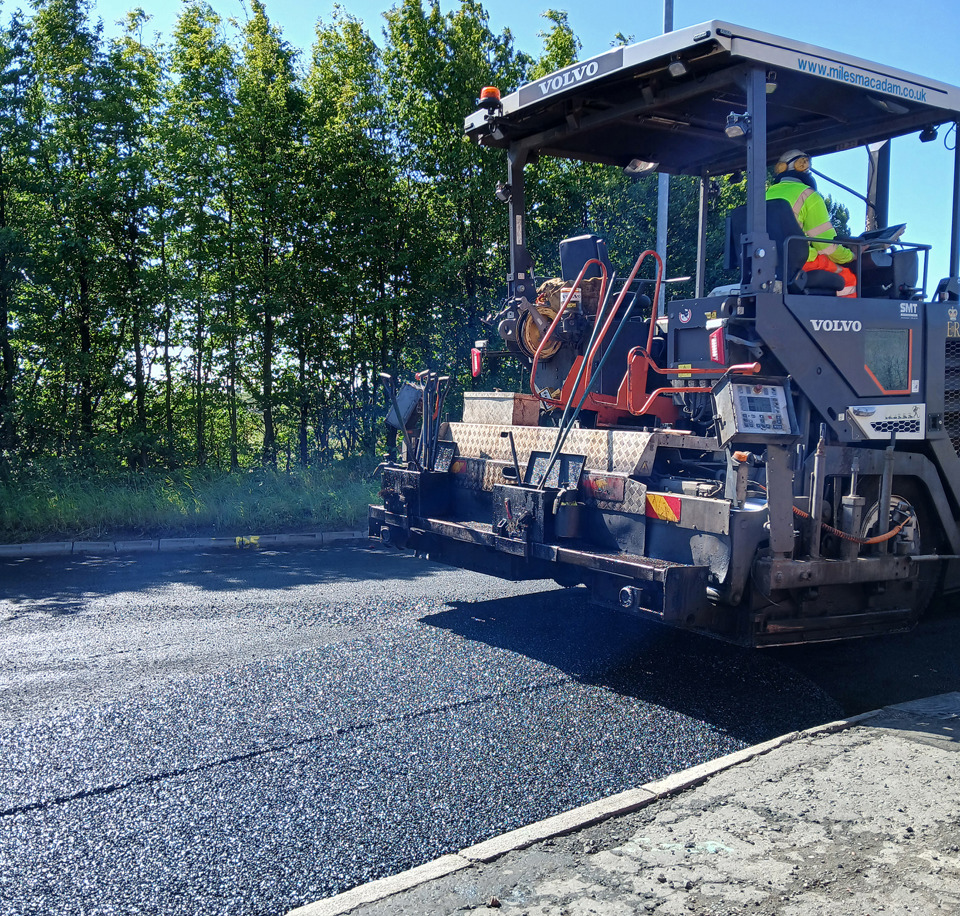Tagged in:

Update from North Lanarkshire and the Centre of Excellence for Decarbonising Roads
This month’s blog comes from Lauren SeBlonka, Innovation Project Manager, at Amey and part of North Lanarkshire Council’s Live Labs 2 project team at the Centre of Excellence for Decarbonising Roads, North Campus.

Over a year into the ADEPT Live Labs 2: Decarbonising local roads programme, the North Lanarkshire Council (NLC) project team have expanded our collective understanding of the challenges and opportunities that exist in the journey to material decarbonisation.
As the ‘North Campus’ of the Centre of Excellence for Decarbonising Roads, our project focuses on identifying, live trialling, evaluating and sharing leading low-carbon materials across the UK, empowering other local authorities to adopt solutions to reduce the sector’s carbon emissions.
The journey to the centre of the decarbonisation challenge
As a project focused on catapulting the sector forward to tackle the complex issue of material decarbonisation, we centred our first year on discovery, baselining and initial testing.
Following the task of shifting from mobilisation to delivery and forming a team of leaders, advisors and partners from the private, public and academic sectors, the first step for our project was a full carbon baseline of North Lanarkshire’s local roads services. This demonstrated key areas of emission for NLC to target locally and provided a benchmark to model future carbon savings of the materials and methods being trialled.
Although reducing carbon emissions is supported by improved knowledge of carbon ‘hotspots,’ we know the sector’s ability to achieve net zero will rely on addressing barriers to low-carbon innovation adoption. Materials remain one of the most carbon-intensive domains in the sector, but the market is flooded with ‘greenwash’, highly context-specific requirements, stringent standards and specifications, and behavioural barriers such as risk-aversion.
To explore solutions, we commissioned behavioural change research as part of developing our open-source knowledge bank for LAs. With our partner, Thinks Insight, we conducted 10 in-depth interviews with LAs across the UK and workshops to map the behavioural journey they take to select and adopt low-carbon materials.
The research provided end-user requirements for the knowledge bank which will be launched at the end of 2024. It also highlighted the individual, material and social influences on behaviours when decarbonising. From budget constraints, pressures to conform, and tendencies to ‘do what we’ve always done,’ our team can now embed these outputs in our project and deploy workstreams to help LAs arrive at the right mindset to decarbonise. You can find a link to the full report in the Further Information section below.
Putting evidence and evaluation at the heart
Underpinning our approach as a Centre, we have been carrying out a series of market scanning sprints aligned to the DMRB (Design Manual for Roads and Bridges) /MCHW (Manual of Contract Documents for Highways Works) series, innovation scorecards for each series, trial designs for top-rated materials and trials on the live road network in North Lanarkshire.
Primary data is enabling full carbon, technical and operational evaluations of the materials that offer high potential to decarbonise our local road network. By taking a systematic approach we are developing a comprehensive review and menu of low-carbon options to share with the sector. Our achievements have included:
- Market-scanning, domestically and internationally in partnership with Connected Places Catapult, of six material categories, totalling over 350 materials.
- Completion of five material scorecards to prioritise solutions for live trial.
- Live trials for pothole repair materials, line-marking, rejuvenators, and a push-off asphalt trailer to extend the lifespan of pavement.
- Draft carbon and cost evaluations of six materials for pothole and patch repair, validated by the Future Highways Research Group.
This process has not been without its hurdles, as the investigation of materials often delivers more questions than answers. Although the challenges are representative across the sector and rarely have a quick solution, shared knowledge will help us move forwards.
Some of our challenges have included:
- Longevity - There is no quick solution to determining the whole lifecycle of many road materials, due to their inherently long life. Unless they fail otherwise, we are limited to accelerated life testing, which is a good substitute but cannot reflect all of the conditions a material is exposed to when left in-situ. This complicates the ability to complete whole lifecycle carbon analyses, a key to the wider transition to science-based decarbonisation.
- Suitability - Although some materials may offer carbon savings for pothole repair on an asset with 10+ years of life left, their embodied carbon may not be worth the trade-off for a road due to be resurfaced in a year. How do we reflect this complexity in asset management and treatment matrices, with carbon in mind?
- Third Party Data - As we have started to delve into the carbon evaluations of the trialled materials, we have encountered suppliers who are not ready yet to provide comprehensive, third-party verified EPDs (Environmental Product Declarations) or carbon statements. What data does exist may be patchy or expensive to collect and report on, limiting the data confidence in any embodied carbon savings.
Looking ahead
To build on a successful first year, our next steps will be focused on delivery of trials, full carbon and technical evaluations, workstreams to tackle barriers to low-carbon innovation adoption, and the launch of the online, open-source knowledge bank for local authorities.
Our trials and subsequent evaluations follow a fence-to-fence approach, with kerbs/footpaths, winter maintenance, surfacing, concrete and other material categories to follow in the next 12 months. In July, we will be completing trials for line-marking, with nine different sites selected to test differences in suitability to different road types and contexts e.g. newly resurfaced roads vs. transverse lines.
A number of barrier-busting work streams will include solutions like an industry playbook for LAs to better understand how to decarbonise materials on their network. This forms part of our joint programme with Transport for West Midlands and with our partner, Connected Places Catapult.
Overall, the first year of the North Lanarkshire Council Live Labs 2 project has provided valuable insight, collaboration across the sector, and a solid foundation of market knowledge. This will ensure we can truly create a Centre of Excellence for Decarbonising Roads with our partner, Transport for West Midlands.
From full carbon baselines to behavioural change, we are excited to continue building on this success in the second year of the project and look forward to sharing more updates as we collectively tackle the complex but rewarding challenge of material decarbonisation.
Further information
- For more information on ADEPT Live Labs 2: Decarbonising Local Roads in the UK, please look at the Live Labs 2 section on the website
- For more information about this Live Labs Project, click here
- LinkedIn – North Lanarkshire Council
- LinkedIn – Transport for West Midlands
- Find the full behavioural insight report here
Other Articles
View all Articles View Article
View Article
Q3 Reflection - Quarterly Newsletter 2025
Read our quarterly newsletter below, with updates from recent trials, events and local authority best practice.
 View Article
View Article
STEM Workshops with Routes to Work
Celebrating Green Careers Week with STEM Workshops at Routes to Work
 View Article
View Article
Q2 Reflection - Quarterly Newsletter 2025
Read our quarterly newsletter below, with updates from recent trials, events and local authority best practice.

Comments